Spotlight on Environmental and Social Concerns in Hong Kong: the WYNG Masters Award
Skip other details (including permanent urls, DOI, citation information)
: This work is licensed under a Creative Commons Attribution-NonCommercial-NoDerivatives 3.0 License. Please contact [email protected] to use this work in a way not covered by the license.
For more information, read Michigan Publishing's access and usage policy.
In 2012, a Hong Kong–based photography prize — the WYNG Masters Award — was conceived with the purpose of sparking awareness of and engaging the city’s inhabitants on socially significant issues of great importance to this densely populated, urban enclave of more than seven million.
Every year since then, a specific theme, rooted in a critical and topical set of concerns challenging the city, is announced, along with an international call for entrants. The award may go to an artist of any nationality residing anywhere in the world, but the work must be made in or related to Hong Kong. This open but defined framework serves to support the development of photographic practice and issue-based knowledge expansion in the city. In conjunction with the award, the WYNG Foundation partners with Hong Kong organizations that focus on social issues or photography.
The work of WYNG Masters Award finalists is exhibited in Hong Kong and published in a catalog. Each artist is also the subject of a short documentary. For more about the WYNG Masters Award and community-related programming, visit www.wyngmastersaward.hk/
Since its inception, the WYNG Masters Award has explored, among other topics, two pressing environmental themes: Air, which considered the implications of, and attitudes toward, Hong Kong’s deteriorating air quality; and Waste, its current theme, which finds Hong Kong grappling with near-capacity landfill limitations. Presented here are three portfolios, by Mandy Barker, Siu Wai Hang, and Ducky Tse Chi Tak, that address issues of waste and air pollution through photography.
Barker takes a forensic approach in her process of investigating consumer and medical waste washed up on Hong Kong’s beaches. Siu, the recipient of the Air award, examines air pollution through its effect on roadside vegetation. Tse’s conceptual series connects urban and suburban dwellers in contemplating the value of clean air.
Although the WYNG Masters Award spotlights Hong Kong’s unique social and environmental challenges, other large cities are also suffering the consequences of inadequate waste management, air pollution, and poverty (the award’s inaugural theme). What happens in Hong Kong has global significance. By focusing on an issue from a local perspective, and by bringing clarity and understanding through its programs, we hope the WYNG Masters Award, and the works featured here, will serve as a case study for other urban centers around the globe.
Mandy Barker: Artist Statement
Hong Kong Soup (湯)
Hong Kong Soup (湯) is a recently completed, long-term project depicting waste plastic collected from more than thirty different beaches in Hong Kong. Over 1,826 tons of municipal waste plastic per day goes into landfill in Hong Kong, and each image reflects the diverse range of these products by highlighting recovered objects or groups having escaped recycling or the landfill.
The images directly relate to the traditions, events, nature, and culture of Hong Kong, with the intention to connect with its people providing awareness about the crisis facing effective waste management. Objects include products from manufacturing, retail, household, and medical waste alongside agricultural-, shipping-, and fishing-related debris.
“Soup” (湯) is a description given to plastic debris suspended in the sea and in this case with reference to the waste crisis in Hong Kong. The series aims to engage with the public by stimulating an emotional response, combining a contradiction between initial aesthetic attraction and awareness to encourage social responsibility.
All debris in these works has been collected over the past three years (since 2012). Photographed in Hong Kong and composed in the United Kingdom, the series represents a wide-ranging collection of waste that has existed for varying amounts of time on Hong Kong’s own doorstep.
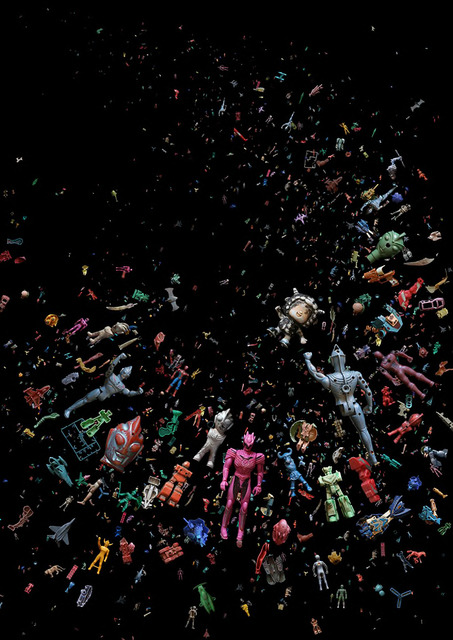 Soup (湯) Transform, recovered toy transformers, part of a collection recovered from various beaches over a three year period, ©Mandy Barker, courtesy of the artist and WYNG Masters Award .
Soup (湯) Transform, recovered toy transformers, part of a collection recovered from various beaches over a three year period, ©Mandy Barker, courtesy of the artist and WYNG Masters Award . 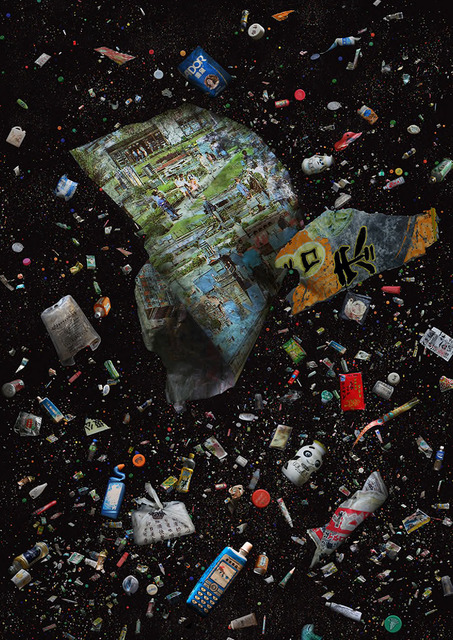 Soup (湯) Packet, waste packaging from single-use food, and drink items with household products, found alongside medical and hazardous waste. Includes; bottle tops and bottles, plastic gift wrap from Shenzhen’s miniature village, condoms, and an IV antibiotic bag. Collected from Tsing Lung Tau & Port Shelter Beach, 2012 and 2013, ©Mandy Barker, courtesy of the artist and WYNG Masters Award.
Soup (湯) Packet, waste packaging from single-use food, and drink items with household products, found alongside medical and hazardous waste. Includes; bottle tops and bottles, plastic gift wrap from Shenzhen’s miniature village, condoms, and an IV antibiotic bag. Collected from Tsing Lung Tau & Port Shelter Beach, 2012 and 2013, ©Mandy Barker, courtesy of the artist and WYNG Masters Award.  Soup (湯) Lotus Garden, a collection of different species of waste artificial flowers, including lotus flowers, leaves and petals, peony, carnation, rose, blossom, holly, ferns, castor and ivy leaves, recovered from various beaches over a three year period, ©Mandy Barker, courtesy of the artist and WYNG Masters Award.
Soup (湯) Lotus Garden, a collection of different species of waste artificial flowers, including lotus flowers, leaves and petals, peony, carnation, rose, blossom, holly, ferns, castor and ivy leaves, recovered from various beaches over a three year period, ©Mandy Barker, courtesy of the artist and WYNG Masters Award. 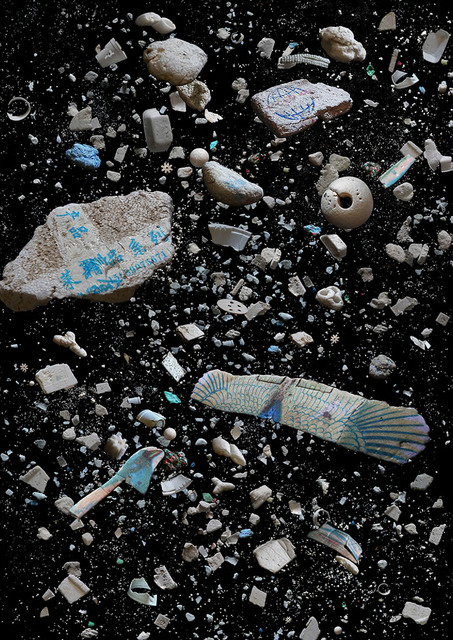 Soup (湯) Polystyrene, representing 52 tons of polystyrene foam dining ware that goes into landfill each day. Includes; polystyrene dining ware, packaging, balls, toys and fishing related debris, collected from five different beaches over one week, 2013, ©Mandy Barker, courtesy of the artist and WYNG Masters Award.
Soup (湯) Polystyrene, representing 52 tons of polystyrene foam dining ware that goes into landfill each day. Includes; polystyrene dining ware, packaging, balls, toys and fishing related debris, collected from five different beaches over one week, 2013, ©Mandy Barker, courtesy of the artist and WYNG Masters Award. 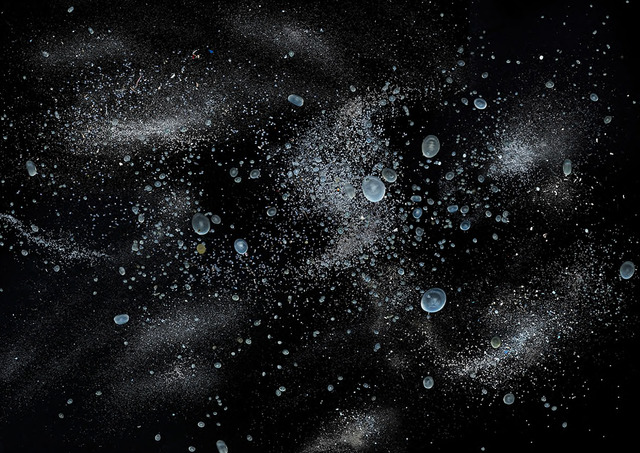 Soup (湯) Spilt, representing 150 tons of nurdles (pre-production pellets), spilt from a cargo container during Typhoon Vicente on 23 July 2012. Recovered from Po Toi, 3 August 2012; Sam Pak Wan, Discovery Bay, 10 August 2012; Tung O Wan, Lamma Island, 15 October 2012; Cheung Sha Wan, Lantau Island, 18 October 2012; Lo Chau, Beaufort Island, 1 November 2012; and South Soko Island Beach, 8 November 2012, ©Mandy Barker, courtesy of the artist and WYNG Masters Award.
Soup (湯) Spilt, representing 150 tons of nurdles (pre-production pellets), spilt from a cargo container during Typhoon Vicente on 23 July 2012. Recovered from Po Toi, 3 August 2012; Sam Pak Wan, Discovery Bay, 10 August 2012; Tung O Wan, Lamma Island, 15 October 2012; Cheung Sha Wan, Lantau Island, 18 October 2012; Lo Chau, Beaufort Island, 1 November 2012; and South Soko Island Beach, 8 November 2012, ©Mandy Barker, courtesy of the artist and WYNG Masters Award. Siu Wai Hang: Artist Statement
The Roadsider
Vehicle emissions are a major source of air pollution at street level in Hong Kong — particularly in urban areas. Of specific concern are emissions from diesel commercial vehicles including trucks, buses, and public light buses, which produce large amounts of particulates and nitrogen oxides. In a crowded urban environment with busy road traffic, like Hong Kong, pollutants can be trapped at street level.
The aim of this project is to photograph collected samples of roadside vegetation from several districts in Hong Kong located close to or in landfills, container yards, and urban areas. These include Lung Kwu Tan, Tseung Kwan O, Lau Fau Shan, Kwai Chung, Mong Kok, and Causeway Bay. The plants were easily collected, because the roots and branches were weak and fragile due to the adverse conditions in which they lived. Dust, particles, and toxic gases block the sunlight and stop photosynthesis, killing roadside vegetation.
The same toxins that roadside vegetation absorb are actually what we breathe on the streets every day in Hong Kong. The death of vegetation is a reflection of Hong Kong’s abominable air quality.
Polluted plant specimens were photographed using a standardized typological photography methodology. Details of tiny particles and dust covering each sample of roadside vegetation are visible in each photo, emphasizing that vehicle emissions are a main culprit of air pollution in Hong Kong.
Ducky Tse Chi Tak: Artist Statement
We Gift the Urbanites with Fresh Breeze
Suburbanites from the North East New Territories comprise farmers, gardening enthusiasts, conservation docents, and people who have lived there as their ancestors had for generations. They are blessed with homes, fields, and fresh air. In the project We Gift the Urbanites with Fresh Breeze, suburbanites gave their fresh air-grown plants to Hong Kongers living in areas affected by serious air pollution. Through this gesture, their hope is to share with the urbanites the idyllic atmosphere of their environment and their love for nature, and to remind them that plants are critical to air purification. The urbanites, in return, created a “sunny doll” — a tradition adopted from rural Japan in which a handmade doll is hung in the window of one’s home representing a wish for sunshine and a blessing for the people of the countryside for the continued health of their plants and their future.
If “development” merely means building more big cities and converting green-belt areas into urban ones, destroying suburbanite life and culture, such development can only bring temporary solutions in the form of a seemingly more comfortable life, more efficient consumption, and easier planning. However, we are, indeed, over-drafting resources that should be for future generations, leaving instead environmental damage that is irreversible. Spiritual development, therefore, is more important. It is achieved through learning to care for and bless each other.
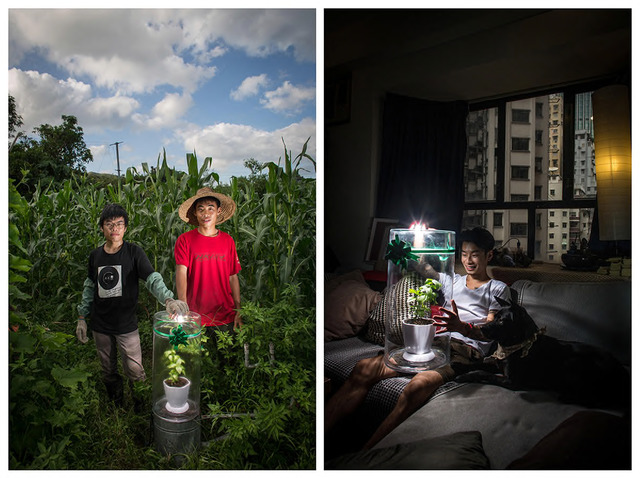 North East New Territories Suburbanites: Sunny, Ka Sun (Farmer, Conservation Docent)Venue: Mashipo, North East New TerritoriesPlant: BasilUrbanite: Lok LokVenue: Causeway BayAs a child, Lok Lok left Hong Kong to live abroad. A few years ago, he moved back to Hong Kong. He said, “The best gift after I moved back is this basil.”Sunny and Ka Sun are brothers. Both of them gave up their jobs in the city for farming. Through trial and error, they always strive to live in harmony with the land. Their brotherhood deepened on this piece of rural land.©Ducky Tse Chi Tak, courtesy of the artist and WYNG Masters Award.
North East New Territories Suburbanites: Sunny, Ka Sun (Farmer, Conservation Docent)Venue: Mashipo, North East New TerritoriesPlant: BasilUrbanite: Lok LokVenue: Causeway BayAs a child, Lok Lok left Hong Kong to live abroad. A few years ago, he moved back to Hong Kong. He said, “The best gift after I moved back is this basil.”Sunny and Ka Sun are brothers. Both of them gave up their jobs in the city for farming. Through trial and error, they always strive to live in harmony with the land. Their brotherhood deepened on this piece of rural land.©Ducky Tse Chi Tak, courtesy of the artist and WYNG Masters Award. 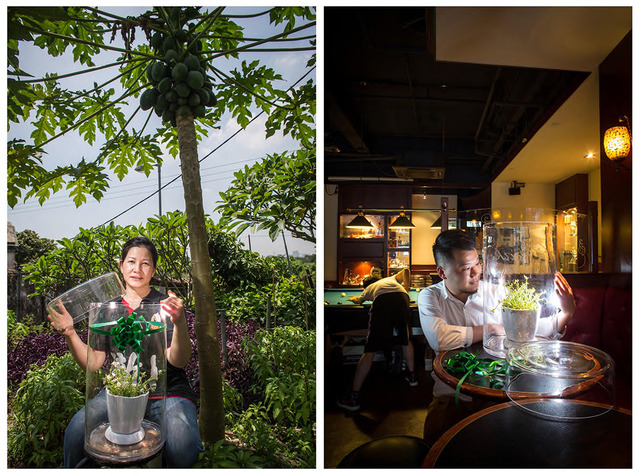 North East New Territories Suburbanite: Auntie Lan (Housewife, Gardening Enthusiast)Venue: Ping Che, North East New TerritoriesPlant: SunflowerUrbanite: AndrewVenue: Prince BarAfter opening the glass bottle, the first thing Andrew said, “What a fresh smell of trees!" I replied, "I collected this under a tree." He said, “I often come to this bar. I find it meaningful to open the bottle here. I can share this air with more urbanites.” The next day, he told me that his plants blossomed. Of course sunflowers would blossom under the sun. Auntie Lan chose this plant as it is easy to take care of. She puts a lot of effort into her little garden. It saddens her that the government wants her to leave this place where she has lived for many years.©Ducky Tse Chi Tak, courtesy of the artist and WYNG Masters Award.
North East New Territories Suburbanite: Auntie Lan (Housewife, Gardening Enthusiast)Venue: Ping Che, North East New TerritoriesPlant: SunflowerUrbanite: AndrewVenue: Prince BarAfter opening the glass bottle, the first thing Andrew said, “What a fresh smell of trees!" I replied, "I collected this under a tree." He said, “I often come to this bar. I find it meaningful to open the bottle here. I can share this air with more urbanites.” The next day, he told me that his plants blossomed. Of course sunflowers would blossom under the sun. Auntie Lan chose this plant as it is easy to take care of. She puts a lot of effort into her little garden. It saddens her that the government wants her to leave this place where she has lived for many years.©Ducky Tse Chi Tak, courtesy of the artist and WYNG Masters Award. 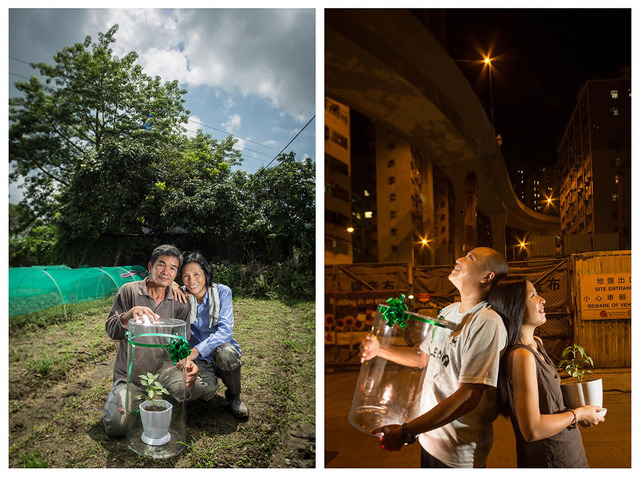 North East New Territories Suburbanite: Mr. and Mrs. Au (Farmers) Venue: Mashipo, North East New TerritoriesPlant: Chili pepperUrbanites: Ah Lung, Siu Ching (husband, wife)Venue: Western DistrictMr. Au once worked in the city, twenty years ago. He preferred farming and has been farming since then. His father was also a farmer. The three generations of the Au family farmed to make a living. Mrs. Au enjoys accompanying her husband in the farming activities. After moving here and breathing fresh air, her chronic allergy has been completely cured. The young, urbanite couple lives in Western District. Since the South Island Line Railway Station construction began in front of their building, their health has been adversely affected by the dust and exhaust emitted daily from the heavy machinery used. They like the chili pepper very much and wish for the coexistence of the village and the city in the future. The also hope one day to replant the green plant on mother earth rather than keeping it in the flowerpot.©Ducky Tse Chi Tak, courtesy of the artist and WYNG Masters Award.
North East New Territories Suburbanite: Mr. and Mrs. Au (Farmers) Venue: Mashipo, North East New TerritoriesPlant: Chili pepperUrbanites: Ah Lung, Siu Ching (husband, wife)Venue: Western DistrictMr. Au once worked in the city, twenty years ago. He preferred farming and has been farming since then. His father was also a farmer. The three generations of the Au family farmed to make a living. Mrs. Au enjoys accompanying her husband in the farming activities. After moving here and breathing fresh air, her chronic allergy has been completely cured. The young, urbanite couple lives in Western District. Since the South Island Line Railway Station construction began in front of their building, their health has been adversely affected by the dust and exhaust emitted daily from the heavy machinery used. They like the chili pepper very much and wish for the coexistence of the village and the city in the future. The also hope one day to replant the green plant on mother earth rather than keeping it in the flowerpot.©Ducky Tse Chi Tak, courtesy of the artist and WYNG Masters Award. 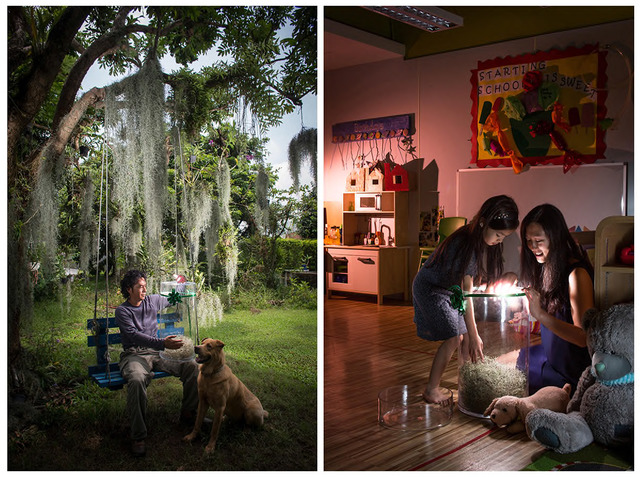 North East New Territories Suburbanite: KK (Gardening Enthusiast, Conversation Docent)Venue: Ping Che, North East New TerritoriesPlant: AirplantUrbanite: Rafaella, Briselle (mother, daughter)Venue: Western District Blooming Buds PreschoolKK spent a few years transforming a plot of barren farmland in front of his house into his own little garden. He read many gardening books from overseas, and through self-learning, he built a little paradise for himself. He told me that generations of his family relocated twice due to urban development.Rafella opened Blooming Buds Preschool in Western District. She teaches the Creative Curriculum (USA) using the Reggio Emilia approach (Italy). Sensorial play is an important element in project-based learning in order to educate future generations to learn with love and passion. Her daughter, she says, is a gift from God.©Ducky Tse Chi Tak, courtesy of the artist and WYNG Masters Award.
North East New Territories Suburbanite: KK (Gardening Enthusiast, Conversation Docent)Venue: Ping Che, North East New TerritoriesPlant: AirplantUrbanite: Rafaella, Briselle (mother, daughter)Venue: Western District Blooming Buds PreschoolKK spent a few years transforming a plot of barren farmland in front of his house into his own little garden. He read many gardening books from overseas, and through self-learning, he built a little paradise for himself. He told me that generations of his family relocated twice due to urban development.Rafella opened Blooming Buds Preschool in Western District. She teaches the Creative Curriculum (USA) using the Reggio Emilia approach (Italy). Sensorial play is an important element in project-based learning in order to educate future generations to learn with love and passion. Her daughter, she says, is a gift from God.©Ducky Tse Chi Tak, courtesy of the artist and WYNG Masters Award. 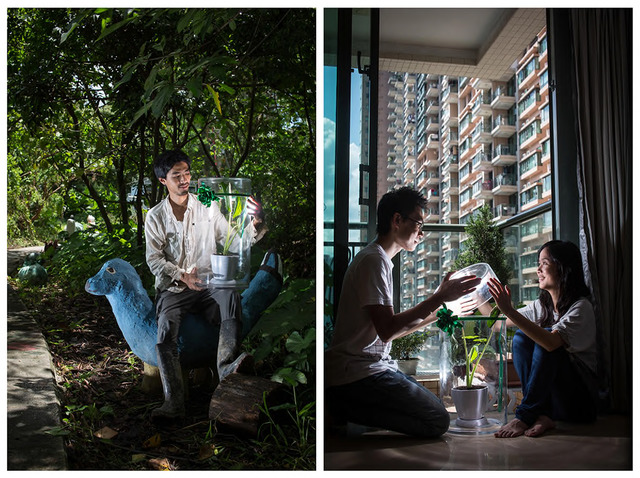 North East New Territories Suburbanite: Chi Ho (Farmer, Video Artist, Conservation Docent)Venue: Mashipo, North East New TerritoriesPlant: TaroUrbanites: Ah Tat, Heidi (husband, wife)Venue: Residence Oasis, Tseung Kwan O This young couple loves to cultivate plants on their small balcony. Ah Tat described where they live as ‘walled buildings’. Growing plants is one of the best ways to clear their minds. Chi Ho gave up a routine job at a television company. He decided to become a farmer. After joining a farming course, his love for the land and nature grew strong. He insisted on regularly collecting kitchen waste in the city for fertilizer, to bring back to the land what was owed by the city. He also intended to educate urbanites on the concept of mutual aid between the city and the rural area. He wants to be a humble farmer.©Ducky Tse Chi Tak, courtesy of the artist and WYNG Masters Award.
North East New Territories Suburbanite: Chi Ho (Farmer, Video Artist, Conservation Docent)Venue: Mashipo, North East New TerritoriesPlant: TaroUrbanites: Ah Tat, Heidi (husband, wife)Venue: Residence Oasis, Tseung Kwan O This young couple loves to cultivate plants on their small balcony. Ah Tat described where they live as ‘walled buildings’. Growing plants is one of the best ways to clear their minds. Chi Ho gave up a routine job at a television company. He decided to become a farmer. After joining a farming course, his love for the land and nature grew strong. He insisted on regularly collecting kitchen waste in the city for fertilizer, to bring back to the land what was owed by the city. He also intended to educate urbanites on the concept of mutual aid between the city and the rural area. He wants to be a humble farmer.©Ducky Tse Chi Tak, courtesy of the artist and WYNG Masters Award. 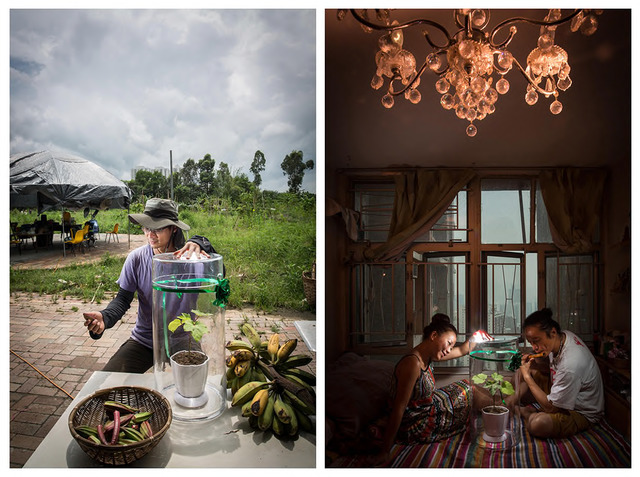 North East New Territories Suburbanite: Mr. Chu (Teacher, Founder of SoIL)Venue: SoIL, North East New TerritoriesPlant: OkraUrbanites: Man, Yanki (husband, wife)Venue: Tsuen WanMr. Chu is passionate about education. He founded SoIL, which teaches Hong Kongers to understand their close relationship with the land and to recognize its importance through farming and education. Man and Yanki are artists. Although their flat in Tsuen Wan measures only 80 square feet, they enjoy the beauty of life in its petiteness.©Ducky Tse Chi Tak, courtesy of the artist and WYNG Masters Award.
North East New Territories Suburbanite: Mr. Chu (Teacher, Founder of SoIL)Venue: SoIL, North East New TerritoriesPlant: OkraUrbanites: Man, Yanki (husband, wife)Venue: Tsuen WanMr. Chu is passionate about education. He founded SoIL, which teaches Hong Kongers to understand their close relationship with the land and to recognize its importance through farming and education. Man and Yanki are artists. Although their flat in Tsuen Wan measures only 80 square feet, they enjoy the beauty of life in its petiteness.©Ducky Tse Chi Tak, courtesy of the artist and WYNG Masters Award. Mandy Barker is an award-winning photographer whose work involving marine plastic debris has received international recognition. Her series SOUP has been published in more than twenty countries, in Time Magazine USA, for example, the Guardian Eyewitness, GEO, CNN, and the Explorers Journal. Her work is currently touring the United States as part of the exhibition Gyre: The Plastic Ocean. She has twice been nominated for the prestigious Prix Pictet, the world’s leading photographic award in sustainability, and in 2014 received an award from LensCulture for her series PENALTY, which involved the collection of seven hundred and sixty-nine marine-debris soccer balls from around the world.
SIU Wai Hang won the 2014 WYNG Masters Award. His work has been shown in the solo exhibition Metropolis Chlorophyll, in K11 Art Mall Hong Kong; and in group exhibitions at the Blindspot Gallery and the Pingyao International Photography Festival 2013. Siu’s work is collected by the Legislative Council of Hong Kong.
Ducky TSE Chi Tak’s photographs have been exhibited in Hong Kong, Japan, the Netherlands, Singapore, China, and France. In 2009, Tse was one of the organizers of the first Hong Kong International Photo Festival. He has received many accolades, including, for multiple years, the Excellence in Feature Photography award from the Society of Publishers in Asia.
Lisa Botos has collaborated with the Hong Kong-based WYNG Foundation in the development of the WYNG Masters Award program. She is a curator, photography specialist, art adviser, former gallerist, and former picture editor (for Time). Botos develops and manages art projects, programming, and events in Singapore, Hong Kong, and other parts of Southeast Asia. Some recent exhibitions are POV: Alternative Perspectives in Asian Contemporary Photography (2013) and How Did We Get Here, Wei Leng Tay’s solo exhibition in Singapore (April–May 2015).










